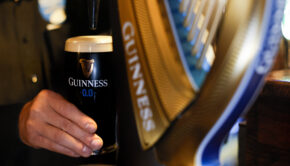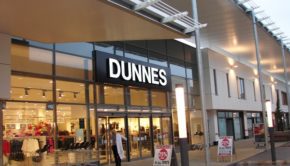In the papers this week 14 – 20 March 2009

Tesco Ireland announces euro-sterling price parity on clothing; cross-border alcohol shopping could cost the State €100m, Kerry wins Breeo acquisition appeal
20 March 2009
Tesco Ireland has introduced euro-sterling price parity on all its clothes, representing a 7% reduction for Irish shoppers based on current exchange rates. However, when The Irish Times’ Connor Pope asked if the chain was planning to introduce price parity across its grocery range, he was told this was a more complex situation, although Tesco was “working to reduce the gap there too.”
Cross-border alcohol shopping could cost the state €100 million in lost tax revenue and up to 400 jobs, says DCU economist Anthony Foley. Nielsen statistics quoted in The Sunday Business Post back his hypothesis.
Ministers are to hold four cabinet meetings over the next week to discuss plans to raise a further €3 billion in tax. The Irish Times reports that official sources see draconian increases in excise duties on alcohol and cigarettes as inevitable. However, some Ministers see little benefit in such increases believing it will simply encourage more cross-Border shopping.
Brian Lenihan reportedly admitted at a private business meeting that he made a mistake by raising VAT in October, says The SBP. VAT differences north and south of the border have already cost the taxpayer more than €700 million.
Research has now shown that up to €550 million was spent by shoppers from the Republic in Northern Ireland last year, reports The Irish Times, with the favourable exchange rate cited as the primary reason.
The Irish Independent reports that UK firm Paypoint is circling electronic payments company Payzone. It is understood that Paypoint has approached the heavily indebted Irish firm’s main banker, RBS, to inquire about doing a deal. Meanwhile, former top executives John Nagle and John Williamson are also considering making a move.
Reox Holdings, the owner of Breeo Foods, has adopted a top-down approach to cost-cutting. The Irish Times reports that it has removed its chief executive Jerry Henchy and axed this position along with other senior management roles. The board says it’s confident all duties will “be absorbed within the revised management structure.”
Also in The Irish Times this morning, the High Court has overturned the Competition Authority’s decision to prohibit Kerry Foods’ acquisition of Breeo. Kerry expects to complete the transaction next week, for the lower price of €140 million, reduced from €165 million on account of current market condiditons.
Meanwhile the Irish Examiner says Henchy’s departure from Reox shows a deep crisis within the group. He highlights the closure of the Galtee plant in Michelstown as a particularly “devastating blow” which prevented the company from fully matching the demands of large multiples.
Barry & Fitzwilliam has struck five new distribution deals, covering 23 drinks brands, according to a report in The Sunday Business Post. The Corkonion company which recently ended its relationship with Maxiuum Worldwide, will earn €18 million annually from new contracts with the Remy Cointreau Group, Beam Global Spirits & Wine, Edrington Group, SPI Group and Bols Amsterdam.
Scottish regional newspaper group Johnston Press has six buyers interested in purchasing its 13 Irish titles up for sale. The Irish Examiner reports that selling titles, including the Dundalk Democrat, Kilkenny People and Limerick Leader, to individual buyers rather than as a job lot could help avoid a lengthy review before the Competition Authority.
The Office of Fair Trading (OFT) in the UK is investigating a deal which would give German producer Dr Oetker a 43% share of the UK pizza market. Oetker wants to acquire Schwan’s pizza business which owns the Chicago Town brand. However, this would put it above the 40% brand threshold usually taken as a dominant position. It would also overtake Northern Foods, the maker of Goodfellas pizzas, reports The Times (UK).
Wal-mart has revamped its private-label range, Great Value, in the US. But while private label sales at Kroger, the largest traditional supermarket chain in the US, accounted for 27% of sales in the final quarter of 2008, private label penetration in Europe is much higher, reports The FT. Own-brand makes up more than 50% of Tesco’s UK sales.
Home cooking is on the rise, according to The Observer (UK). Multiples have reported that the likes of economy spuds and classic ingredients for a Sunday roast are up in the current climate. In-store recipe cards are proving an effective way of capitalising on the trend; when Sainsbury’s featured basic beef chunks on an in-store recipe card, purchases rose by 2000%
Chocolate brand Lindt and Sprüngli is to close two-thirds of its retail boutiques in the US. The FT reports that the manufacturer is experiencing slowing sales growth, following several years of record sales and profits. The company introduced its own boutiques in 1994 to raise brand awareness, but now says it no longer needs them as most of US sales are made through well-known retailers like Wal-Mart.



 Print
Print






Fans 0
Followers